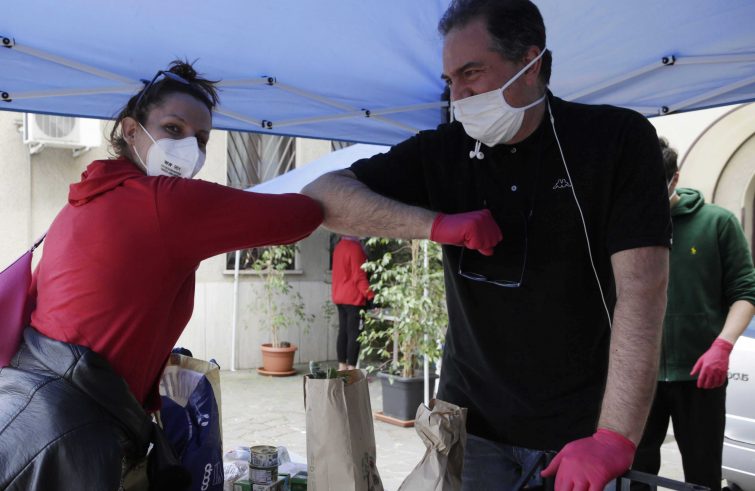
During the lockdown, Rome’s parishes and their 176 outreach centres coordinated by the diocese responded to an unprecedented demand for food and financial aid. Since March 2020, the COVID-19 health crisis in Rome has tragically been marked by a social and food emergency. In June 2020, 600% more food supplies were distributed compared to the same period last year. In the last nine months, 35.3% of people who turned to parish outreach centres had never sought their assistance before. Over 83% of these centres were assisting new poor.” The three Caritas soup kitchens in Rome providing assistance to the poorest saw a 50% increase from April to June. The data contained in the 2020 Report “Poverty in Rome: a point of view”, published by the Diocesan Caritas office in Rome and presented online today, is dramatic.
These figures confirm the national trend, albeit perhaps to a worse degree. Rome was marked by some tragic situations even before COVID-19, with large pockets of fragility and disparities, strong polarizations that have also broadened the gap between the highest and lowest social classes. In 2019, the annual income of 40% of Rome’s citizens was below €15,000. As many as 35,780 people filed for Citizens’ Income, 6,629 for Citizens’ Pensions.
The lockdown pushed people walking on a tight rope of poverty into extreme poverty.
The long-standing housing problem (marked by eviction orders) precarious jobs, isolation and loneliness of the elderly in an increasingly ageing city (170 over-65s for every 100 people under 14), thousands of homeless, mentally ill and disabled people, lack of cooperation from institutions and now COVID-19. The 130-page volume published by Caritas Rome analyzes the many critical issues in the city, marked by increasingly complex and diverse forms of poverty.
Meals served in the three diocesan soup kitchens increased by 50% between April and May. For example, in the period March-September, the three diocesan soup kitchens “Giovanni Paolo II”, “Don Luigi Di Liegro”, and “Gabriele Castiglion” (re-organized in compliance with health safety measures) served 238,246 meals compared to 185,062 the previous year, with a 28.7% increase in activity. It reached a peak in the months of April, May and June, with a 50% rise compared to 2019, primarily migrant youths, beneficiaries of international protection.
Soaring numbers of parish-assisted persons. The Report documents a sharp increase in the number of people assisted by parishes: 85.9% of outreach centres in Rome’s parishes registered an impressive rise in the number of people helped (with a tenfold increase in some cases). Most parishes reported an increase of up to 50 people more.
In 6 cases, there were 500 more people receiving assistance.
35.3% new poor, almost half of them Italian. In the first nine months of 2020, 21,160 people turned to outreach centres, 35.3% of these for the first time (7,476 people). In 48.7% of cases, those who contacted the parish relief centres for the first time (7,476 people) were Italian, followed by Filipinos (16.3%), mostly live-in caregivers of assisted persons who were left without income or housing. 64.4% of these were women. 54% of new beneficiaries were less than 45 years old, while those over 65 accounted for 14.7%. 4,621 new beneficiaries requested food aid in the form of food packages and shopping vouchers (62%), in 30% of cases through access to Solidarity Stores and in 8% of cases through the activation of the Anti-Crisis Fund, with a maximum contribution of € 500 for urgent expenditures such as bills, apartment building fees, medical expenses and household repairs.
Help line requests for food skyrocketed: up 345% in May, 600% more in June. In May 2019, 23,387 tons of basic necessities had been delivered compared to 80,342 in the year 2020, amounting to a 345% increase. In June there was a 600% increase compared to 2019. Virtually all outreach centres distributed food packages (in 98.8% of all cases), followed by counselling for shopping vouchers requests (55.8%), requests for parish and diocesan fund allocations (54.1%), assistance to elderly persons living alone (25.6%).
Who turned to the parish for help? During the lockdown, persons with closed-end contracts discontinued as a result of restrictions, long-term unemployed, precarious workers, laid-off employees, as well as short-term and seasonal workers awaiting benefits turned to the parishes for assistance. It should be noted that there was also a high proportion of retired people, amounting to 51.5%.
The main requests include: food (84.3%), joblessness/income loss (79.1%) and financial help to pay the rent or mortgage (71.5%).
In addition, parishes reported 5.7% of incidents of domestic violence.
Many and diverse solidarity efforts were carried out. These include food aid, Caritas charity Emporiums, the Anti-crisis Fund, shopping vouchers, and the Jesus Divine Worker Fund established by Pope Francis, who donated €1 million to the Diocese of Rome. In response to the food emergency, Rome’s Caritas Centre set up 137 food pantries and 13 food warehouses, thereby ensuring supplies to its five Solidarity Emporiums. Since last March, the Emporium located in the Charity Citadel in Rome responded to the needs of approximately 100 families per day, also supplying parishes, ecclesiastical institutions, religious communities and members of circus communities. The anti-crisis Fund created to respond to the growing demand for assistance has allocated 489 grants amounting to €175,021.16 from April to September 30. Shopping vouchers for supermarket purchases, courtesy of the Fondazione Roma’s €1 million donation, were delivered to 3,029 households (October 2020). 18,105 €15 vouchers have been distributed, amounting to € 200,000 which have already been spent.
The generosity of individuals and businesses: in addition to large donations from big companies and supermarkets, donations to parishes from private citizens (money and basic necessities) amounted to 65.5%. In 30.4% of cases, parishes received relief from the Civil Defense, with 19.3% coming from local retailers or businesses. Almost 59.9% of parish outreach centres received some form of contributions.












